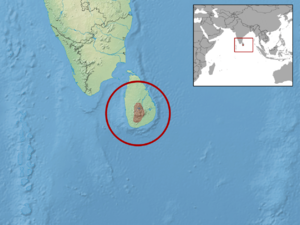Lankascincus taprobanensis facts for kids
Quick facts for kids Lankascincus taprobanensis |
|
|---|---|
| Conservation status | |
| Scientific classification |
|
| Kingdom: | Animalia |
| Phylum: | Chordata |
| Class: | Reptilia |
| Order: | Squamata |
| Family: | Scincidae |
| Genus: | Lankascincus |
| Species: |
L. taprobanensis
|
| Binomial name | |
| Lankascincus taprobanensis (Kelaart, 1854)
|
|
 |
|
| Script error: The function "autoWithCaption" does not exist. | |
| Synonyms | |
|
|
Script error: No such module "Check for conflicting parameters".
The Ceylon tree skink (also known as the smooth Lanka skink) is a type of lizard. It belongs to the Scincidae family, which are often called skinks. This special lizard lives only on the island of Sri Lanka. You won't find it anywhere else in the world!
Where It Lives
This skink lives high up in the mountains of Sri Lanka. It can be found from about 1,000 meters (3,280 feet) to 2,300 meters (7,545 feet) above sea level. It's the only skink that lives at such high elevations in Sri Lanka! You can often spot them in places like Horton Plains, Hakgala, Namunukula, and Nuwara Eliya.
What It Looks Like
The Ceylon tree skink has a strong, sturdy body. Its tail is quite long, about 1.3 to 1.5 times longer than its body. The scales on its back can be gray, reddish-brown, brownish-yellow, or olive-colored. Each scale often has a small dark spot in the middle.
It has a brownish-black stripe along its side. This stripe runs from its eye all the way to the base of its tail. You might see small yellowish-cream spots within this stripe. The skink's belly is a bright lemon yellow. Its throat is a pale blue with a few dark spots. The eyes of this skink are a very dark brown.
What It Eats
The Ceylon tree skink is a carnivore, which means it eats other animals. Its main diet includes different kinds of insects.
Life Cycle
Female Ceylon tree skinks lay their eggs in loose soil. They usually lay one or two eggs at a time. Each egg is quite small, measuring about 7 millimeters by 12.5 millimeters (about 0.27 by 0.49 inches). When the baby skinks hatch, they are very tiny, only about 19 millimeters (0.75 inches) long!
 | James Van Der Zee |
 | Alma Thomas |
 | Ellis Wilson |
 | Margaret Taylor-Burroughs |


